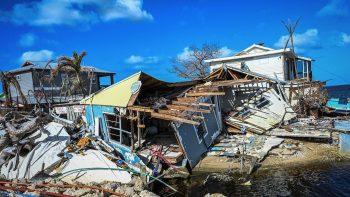Preparing for emergencies at the workplace
Share Now on:
Preparing for emergencies at the workplace
Jeremy Hobson: Well it’s been a big week for earthquakes around the world. Luckily not a lot of damage is being reported after those two 8-pointers off of Indonesia the 6.9 quake off Mexico and the 5.9 quake off of Oregon — all on Wednesday. Now even if you’re prepared for a disaster like an earthquake at home, what would you do if it happens while you’re at work?
For more on that, let’s bring in David Lazarus, consumer columnist for the L.A. Times. Hi David.
David Lazarus: Hi Jeremy.
Hobson: So how prepared are we for disasters like tornadoes or earthquakes or whatever?
Lazarus: Not so much, it looks like, according to a survey that was done last year by Wells Fargo and Gallup. Turns out that more than half of all the businesses that were surveyed said they weren’t that concerned about a disaster affecting them, and then of those that were taking it at least seriously — roughly half there as well — said they were only somewhat prepared. So basically if disaster strikes, your company might not necessarily have it all together.
Hobson: What should companies be doing to be prepared for things like that?
Lazarus: It turns out that there is a lot of good information out there, and some of the best comes from the the Occupational Safety and Health Administration, or OSHA. They’re got a very voluminous manual on this, and among the highlights there are determining your worst-case scenario. For example, if you work in a nuclear power plant, your concerns are going to be different than if you worked in, say, a hydroelectric plant. Obviously you want to work out what the situation’s going to be. Most importantly, develop an emergency action plan, so people aren’t just running around going ‘oh my goodness’ — they know what they’re supposed to be doing. Then make sure that the employees know what the plan is. That’s very important: making sure that everyone is looped in. And then not least of which, make sure you’ve got enough equipment on hand to deal with whatever might happen.
Hobson: And David, I mean I have to say, I don’t know exactly what the plan is here at Marketplace. Do you know what your plan is? How prepared is the L.A. Times for something like that?
Lazarus: I’d like to think we’re very prepared. We’re in earthquake country, and yet when I went rooting around in the newsroom for our gear, it took some doing. I finally found some cabinets that had medical equipment and flashlights — and a whole bunch of red hard hats. So either we’re really prepared or we’re all set for a Village People reunion tour.
Hobson: L.A. Times consumer columnist David Lazarus. Thanks a lot.
Lazarus: Thank you.
There’s a lot happening in the world. Through it all, Marketplace is here for you.
You rely on Marketplace to break down the world’s events and tell you how it affects you in a fact-based, approachable way. We rely on your financial support to keep making that possible.
Your donation today powers the independent journalism that you rely on. For just $5/month, you can help sustain Marketplace so we can keep reporting on the things that matter to you.


















